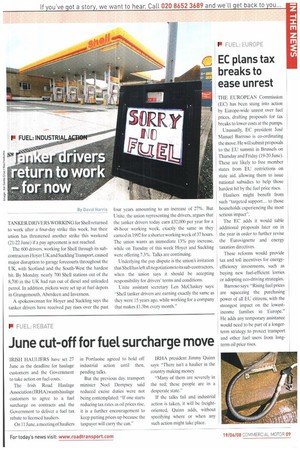By David Harris TANKER DRIVERS WORKING for Shell returned to
Page 9

If you've noticed an error in this article please click here to report it so we can fix it.
work after a four-day strike this week, but their union has threatened another strike this weekend (21-22 June) if a pay agreement is not reached.
The 600 drivers, working for Shell through its subcontractors Hoyer UK and Suckling Transport, caused major disruption to garage forecourts throughout the UK, with Scotland and the South-West the hardest hit. By Monday, nearly 700 Shell stations out of the 8,700 in the UK had run out of diesel and unleaded petrol. In addition, pickets were set up at fuel depots in Grangemouth, Aberdeen and Inverness.
A spokeswoman for Hoyer and Suckling says the tanker drivers have received pay rises over the past four years amounting to an increase of 27%. But Unite, the union representing the drivers, argues that the tanker drivers today earn £32,000 per year for a 48-hour working week, exactly the same as they earned in 1992 for a shorter working week of 37 hours. The union wants an immediate 13% pay increase, while on Tuesday of this week Hoyer and Suckling were offering 7.3%. Talks are continuing.
Underlying the pay dispute is the union's irritation that Shell has left all negotiations to its sub-contractors, when the union says it should be accepting responsibility for drivers' terms and conditions.
Unite assistant secretary Len McCluskey says: "Shell tanker drivers are earning exactly the same as they were 15 years ago, while working for a company that makes f1.3bn every month."
















































































































































































































